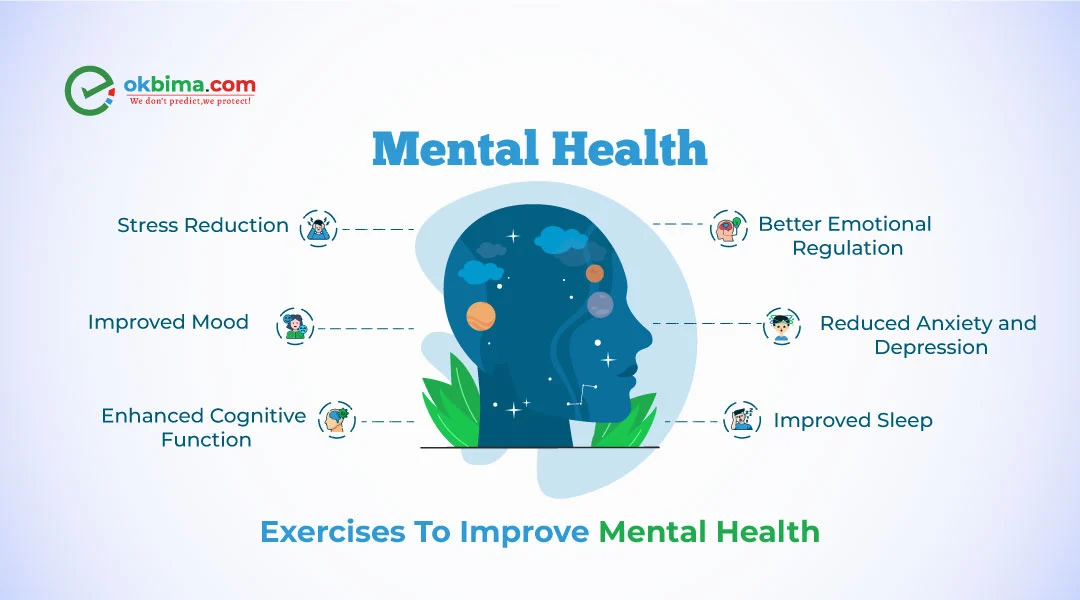

Mental health is an essential part of overall well-being, and doing regular exercise can have a significant impact on improving your mental health. Physical activity has been shown to reduce symptoms of anxiety and depression, as well as boost self-esteem. From yoga and meditation to cardio and strength training, many exercises can benefit your mental health.
Mental health is all about how we feel and think, and how we get along with others. It affects our mood, actions, and how we handle tough times. Whether we're kids or grown-ups, it's important to take care of our mental health.
Mental health exercises are essential for maintaining and improving mental well-being for many reasons such as stress reduction, improved blood, reduced anxiety, etc.
Mental health exercises, such as mindfulness and relaxation techniques, help reduce stress. These practices can lower cortisol levels, which is the hormone associated with stress, thereby promoting a sense of calm and relaxation.
Regularly doing mental health exercises can enhance mood. Activities like physical exercise, meditation, and practicing gratitude have been shown to increase the release of endorphins and serotonin, which are chemicals in the brain that promote feelings of happiness and well-being.
Mental exercises, such as puzzles, reading, and learning new skills, help keep the brain active and engaged. This can improve cognitive functions, including memory, attention, and problem-solving skills.
Don't Compromise On Your Health & Be Protected: View Plans!
Practices like mindfulness and cognitive-behavioral techniques help individuals become more aware of their thoughts and emotions. This awareness allows for better emotional regulation and management of negative emotions that can cause a more balanced emotional state.
Mental health exercises can be effective in managing symptoms of anxiety and depression. Techniques such as deep breathing, progressive muscle relaxation, and mindfulness meditation have been shown to reduce symptoms of these conditions.
Mental health exercises can improve sleep quality by reducing stress and anxiety, which are common causes of sleep disturbances. Better sleep can enhance overall mental and physical health.
Doing regular mental health exercises can increase resilience, which is the ability to recover from life’s challenges. Building resilience helps individuals handle stress more effectively and bounce back from setbacks.
Take The First Step Towards A Healthier, Worry-Free Future: Get Health Insurance Today!
Mental health exercises, particularly those focused on communication and empathy, can improve relationships. Better mental health causes more positive interactions with others and a greater ability to form and maintain healthy relationships.
Activities that promote self-reflection and self-compassion can boost self-esteem and self-worth. Feeling good about oneself contributes to overall mental health.
Regular mental health exercises can help to reduce mental health issues. Just as physical exercise prevents physical health problems, mental health exercises can help prevent mental health disorders from developing or worsening.
Invest In Your Well-Being With Affordable Health Insurance Options: Ask Our Expert!
Mental health exercise is important for many reasons such as stress relief, improved mood, better sleep, social connection, etc.
Stress relief: Exercise can reduce levels of the body's stress hormones, such as adrenaline and cortisol, and stimulates the production of endorphins, which are natural mood lifters. Regular physical activity can help to reduce symptoms of stress and anxiety.
Improved mood: Physical activity can also help improve mood and reduce symptoms of depression. Exercise has been shown to increase levels of serotonin and dopamine, neurotransmitters that play an important role in regulating mood and emotions.
Enhanced cognitive function: Regular exercise can improve cognitive function, including better memory, focus, and decision-making skills. Physical activity can stimulate the growth of new brain cells and improve overall brain health.
Increased self-esteem: Exercising can make you feel better about yourself and more confident. Meeting fitness goals and feeling strong can improve your overall health and happiness.
Better sleep: Exercise can improve the quality of sleep and help to reduce symptoms of insomnia. Physical activity can help regulate the body's sleep-wake cycle and promote sleep.
Social connection: Participating in group exercise classes or sports activities can provide opportunities for social interaction and connection, which are important for mental health. Building relationships can help to fight the feelings of isolation and loneliness.
Read More:
Infertility: Types, Symptoms, Causes, Diagnosis, Test, Treatment & Prevention
High BP (Blood Pressure Or Hypertension): Symptoms, Causes & Foods To Avoid
Top 10 Benefits Of Regular Exercise & Its Importance In Our Daily Life
Colorectal (Colon) Cancer: Causes, Symptoms, Treatments & Surgery
Weight Loss: 10 Tips, Diet Plan For Male & Female, Exercises, Foods & Drinks
In conclusion, mental health exercises are crucial for maintaining overall well-being. Regular physical activity, mindfulness practices, cognitive exercises, and social connections can all have a significant impact on improving mental health. By doing many health exercises, you can reduce stress, improve mood, enhance cognitive function, and boost self-esteem, and resilience.